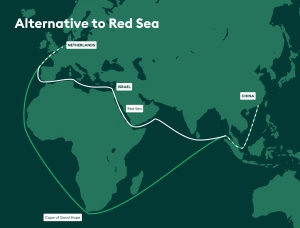


(Posted on 23/04/24)
Conflict in the Red Sea has brought massive carbon emissions increases in ocean freight shipping, according to data released by Xeneta.
The Xeneta and Marine Benchmark Carbon Emissions Index (CEI), which measures carbon emissions per ton of cargo transported across the world’s top 13 trades, hit 107.4 points in Q1 2024 - the highest it has been since the index began in Q1 2018.
For containers being shipped via ocean from the Far East to Mediterranean, the CEI reveals carbon emissions increased by 63% in Q1 2024 compared to Q4 2023. From the Far East into North Europe, carbon emissions increased by 23%.
This is a direct result of conflict in the Red Sea region, which escalated in December and has seen most ocean freight container services avoid the Suez Canal due to the threat of attack by Houthi militia.
Emily Stausbøll, Xeneta Market Analyst, said: “We are all aware of the human and economic cost of war, but this data demonstrates there is also price to pay for the climate.
“Containers being shipped to the Mediterranean from the Far East travelled 9,400 nautical miles on average in Q4 before the escalation in the Red Sea. They are now sailing an additional 5,800 nautical miles due to diversions around the Cape of Good Hope in Africa, with the inevitable consequence of more fuel being burned.
“Ships are also being sailed at higher speeds in an attempt to make up time due to the longer distances, which again results in more carbon being burned.”
With the largest ocean freight carriers still choosing to avoid the Red Sea, cargo from the Far East is now arriving via ocean at ports such as Jebel Ali in the Arabian Gulf before being flown out of Dubai Airport for onward transportation to Europe and North America.
As a result, air cargo demand from Dubai Airport to European destinations increased by 190% in March compared to the same month in 2023.
Stausbøll said: “Not only is air freight more expensive than ocean freight it is also far less sustainable, so this shift to hybrid sea-air services via the Middle East will result in increased carbon emissions per ton of cargo transported.
“Shippers are also now once again using rail services through Russia to transport goods from the Far East to Europe, which similarly to air freight, is more carbon intensive than ocean freight shipping.
“Ocean freight container shipping is only one sector, but this clearly demonstrates the massive impact war can have on carbon emissions and the climate.”
The deterioration of carbon emissions performance comes at a time when the International Maritime Organization (IMO) is working towards net zero in global ocean freight shipping by or around 2050.
2024 has also seen the introduction of EU-ETS regulations which require ocean freight service providers to pay a subsidy based on the amount of carbon emitted on sailings to and from European ports.
Stausbøll said: “The initial IMO targets are based carbon intensity rather than actual emissions so longer sailing distances won’t necessarily have a negative impact on these measurements.
“However, this peculiarity in the way the IMO records carbon performance cannot hide the fact that conflict has the potential to have a detrimental impact on the sustainability of global supply chains.
“Longer sailing distances will also see an increase in the cost of ocean freight shipping. As well as needing more fuel to sail around Africa, higher CO2 emissions will result in a higher EU ETS bill for ocean freight carriers.
“Carriers will do what they can to pass these costs on to the businesses shipping the goods, whether that is through increasing ocean freight shipping rates or additional surcharges – either way there is a financial price to pay.”
AtoB@C Shipping, a subsidiary of ESL Shipping, has announced the successful delivery of Fleximar, the... Read more
Western Bulk, together with reputable Norwegian partners A/S J. Ludwig Mowinckels Rederi, Premium Maritime... Read more
Pacific Basin Shipping Limited, one of the world’s leading dry bulk shipping companies, has announced... Read more
Columbia Group anticipates a period of strong expansion as an increasing number of international shipowners... Read more
Norse?Ship Management has expanded its use of Smart Ship Hub’s high frequency sensor data and... Read more
As the maritime industry gears up to welcome the IMO’s STCW bullying and harassment training amendments... Read more
NORDEN has acquired the cargo activities of Taylor Maritime in Southern Africa (previously operated... Read more
Philippos Ioulianou, Managing Director of EmissionLink, has warned the IMO’s decision to delay... Read more
VIKAND has highlighted the need for cultural change in the maritime sector as reports of bullying, harassment... Read more
The maritime industry is experiencing a period of significant transformation, driven by rapidly evolving... Read more